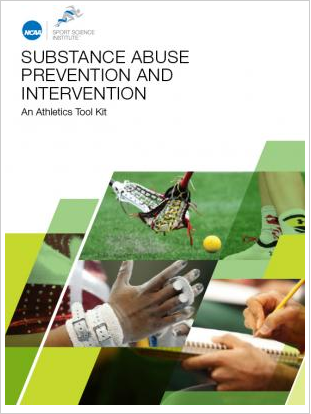The NCAA's Substance Abuse Prevention and Intervention Tool Kit provides extensive information to develop campus-specific plans for student-athlete substance misuse prevention. A summary of Tool Kit resources is provided below.
I. NCAA Resources for Assessment & Planning
- Campus Road Map and Collaboration Team Tool — These worksheets identify campus services with which athletics department staff may connect for specific substance misuse prevention support.
- NCAA Student-Athlete Data — The NCAA research staff conducts national research for its members on a wide variety of topics including student-athlete substance use, social environments, well-being, and many others.

II. NCAA-Sponsored Educational Resources.
- APPLE Training Institute — A three-day in-person training program developed by the University of Virginia's Gordie Center for student-athletes, athletics administrators and campus partners to facilitate athletics department needs assessments, strategic planning and implementation strategies to support student-athlete wellness and substance misuse prevention. The Gordie Center developed student-athlete blood alcohol content (BAC) educational cards that contain a standard drink conversion chart and signs of alcohol overdose, as well as student-athlete specific statistics and information on how alcohol impacts athletic performance.
- Coaches Assist — An interactive in-person workshop designed to help coaches communicate more effectively with their student-athletes. Drawing from the fields of health promotion, prevention science and motivational interviewing, it demonstrates the basic skills and strategies for effective conversations and to recognize and more effectively address substance use concerns of student-athletes.
- Substance Use Facts for Student-Athletes – An educational infographic designed for student-athletes that includes facts and figures about substance use.
III. NCAA Publications and Other Reliable Resources.
- Addressing Sexual Assault and Interpersonal Violence: Athletics’ Role in Support of Healthy and Safe Campuses Sexual violence is embedded at all levels of society, including academic institutions. NCAA member schools can help address this systemic issue by leading prevention efforts to reduce incidents of sexual violence involving student-athletes and other college students, and by responding appropriately to them when they occur. The tool kit provides resource-independent tools for athletics administrators in their efforts to create campus communities free of violence and safe places for students to learn and thrive.
- Mental Health Best Practices: Understanding and Supporting Student-Athlete Mental Wellness — The NCAA's resource-independent recommendations for member schools to support and promote student-athlete mental wellness in partnership with campus stakeholders.
- NCAA Sport Science Institute webinar series, the SSI Spotlight on Mental Health Best Practices — served to inform and support the membership in advance of an expected update to the Interassociation Consensus Document: Best Practices for Understanding and Supporting Student-Athlete Mental Wellness in January 2024 (listed above). The series highlighted practical, campus-based implementation strategies and explored the updated guidance anticipated in the second edition of the NCAA Mental Health Best Practices. The webinar series is available to membership in the NCAA Learning Portal and is also publicly available on the NCAA Resources SSI Channel.
- NCAA Alcohol, Tobacco and Other Drug Education Guidelines — A checklist and timeline to assist athletics administrators in providing timely programming to educate student-athletes about NCAA banned drugs and the products that may contain them.
- College Alcohol Intervention Matrix (AIM) — A comprehensive, searchable guide created by the National Institute on Alcohol Abuse and Alcoholism (NIAAA) to help schools select evidence-based programs for substance misuse prevention.
- Generation Rx Safe Medication Practices for Life — A project developed by The Ohio State University School of Pharmacy with online videos, visual aids and resource kits, created by and for college students to help prevent prescription drug misuse on college campuses.
- Opioid Prescribing in College Health — A white paper from the American College Health Association.
- The Higher Education Center for Alcohol and Drug Misuse, Prevention and Recovery promotes student success nationally by providing data-driven solutions to alcohol and drug misuse and leads the dialogue on collegiate alcohol and drug misuse and recovery in the national agenda.
- The University of North Carolina at Greensboro’s Center for Athlete Well-being works to improve the health and wellness of all athletes through the translation of prevention research to effective programs, policies and practices through evidence-based programming, training, and research/evaluation.
- Substance Abuse and Mental Health Services Administration Treatment Locator is a confidential and anonymous online tool for individuals seeking to locate treatment facilities for substance misuse/disorder and/or mental health concerns.
- Drug Free Sport AXIS can be accessed by NCAA athletes, coaches, and athletic trainers by going to axis.drugfreesport.com and creating a free account. From here users can create an inquiry into a dietary supplement, which will be assigned a risk level on a scale of one to three. Athletes are given information needed to make informed decisions based on ingredients and marketing associated with the product. From here it is up to the athlete to decide whether the risks associated with usage of dietary supplements is worth it.
- myPlaybook — An online curriculum designed to prevent harm related to alcohol and other drugs and to promote student-athlete wellness. Interactive web-based modules target health promotion strategies such as social norms, behavioral expectancies, behavioral intentions, bystander decision making and harm prevention skills. Modules include personalized feedback, technical assistance and user-friendly administrative and data collections tools to facilitate quality program delivery and program assessment.
- 360 Proof — The NASPA Small Colleges and Universities Division offers 360 Proof, a comprehensive, evidence-based program that helps participating schools reduce the consequences of high-risk alcohol use and enhance collaboration between athletics and student affairs. All NASPA Small College and Universities Division institutions have free access to the program, which is provided as a membership benefit.

